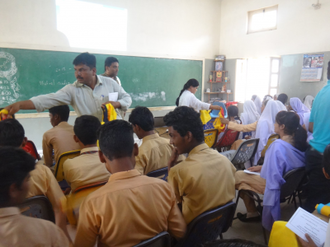Pakistan: Mission to promote ecological awareness

Cloth bags handed out
The Hyderabad Diocesan Ecology Team has been promoting ecological awareness with the support of Fr Liam O'Callaghan and Danish Yakoob of the Columban team for Justice Peace and Integrity of Creation (JPIC). The latest workshops were on Plastic.
Workshops on Plastic pollution
At the end of March, two workshops were held, in Mirpurkhas and Badin to learn about plastic pollution. At Mirpurkhas, 24 members of the newly-formed Mahool Dost (Friends of the Earth) group gathered at St. Michael's parish. In Badin, St. Paul's High School was the venue for a Seminar on 'Causes, Effects and Solutions of Plastic Pollution' with the school principal and 45 students as well as their teachers participating.
The first session, presented by Fr Liam O'Callaghan, outlined the history of plastic, when it was first made and how it developed and began to really increase in the 1970s and 1980s. There has been a huge increase in the production of plastic in recent years and so many of everyday items used are now made of plastic. This of course, leads to plastic waste and it is estimated that 8.8 million tones of plastic waste are dumped in the ocean every year. This causes tremendous damage to sea birds and mammals; it is estimated that 100,000 mammals and one million birds are killed because of ingesting plastic or getting caught in plastic nets, waste etc.
Danish Yakoob then introduced the practical steps and changes in lifestyle which can and must be made. He used the "Five R's strategy for fighting plastic pollution"- Refuse, Reuse, Reduce, Remove, Recycle - to guide how to change habits in order to reduce use of plastic and so also reduce the negative effects of plastic waste on the environment and on human health.
Finally, Danish presented on the Leadership Skills needed to be an effective environmental activist or group. This centred on goal setting with proper planning in order to ensure effective implementation and positive results. At the end, all the participants were given four cloth shopping bags each, in order to replace the plastic shopping bags often used while shopping; and in using them also to become an example for others, including shopkeepers.


















